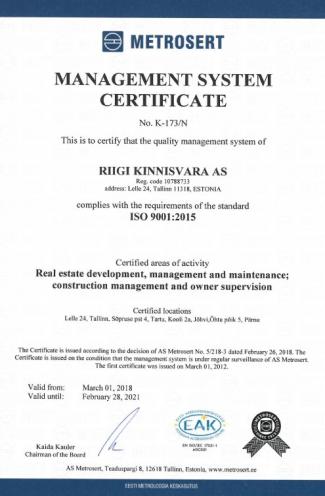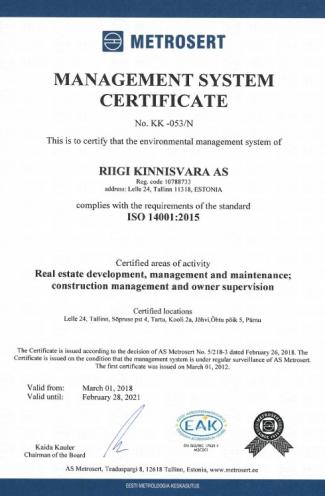Font size
Lineheight
Contrast
Quality and environmental management
Management system
On 13 November 2007, Riigi Kinnisvara AS was issued the first IS0 9001:2000 quality management system certificate.
In 2018, the ISO 14001:2015 environmental management system certificate and the ISO 9001:2015 quality management system certificate were renewed. The issued certificates prove that the company's activities in the area of real estate development, management and maintenance and construction management and owner's supervision are in compliance with the requirements of the above standards.
Certificates
| ISO 9001 | ISO 14001 |
 |
|
Principles of the environmental and quality management system
The quality and environmental policy of Riigi Kinnisvara AS (RKAS)
Introduction
The objective of RKAS is to be the preferred partner for the public sector in the provision of real estate environment and to ensure the sustainable, prudent and efficient governance and management of the real estate environment.
Our environmental policy directs course to sustainable use of resources – this is part of our responsible behaviour. We take account of economic justification upon planning and implementing activities related to environmental and energy savings.
The quality policy gives direction meeting the expectations of the owner and the objectives of the company through the satisfaction of clients, partners and employees. RKAS uses a management system which complies with the ISO 9001 (quality management) and ISO 14001 (environmental management) standards. The management system covers all of RKAS's areas of activity, i.e. the management and maintenance of real estate, real estate development and real estate investments, the purchase, sales and leasing of real estate, project management.
Terms and definitions
Quality management consists of activities which are planned and carried out to ensure the effective functioning of RKAS's services.
Environmental and energy efficiency management consists of activities which ensure environmental friendliness and the optimal use of energy resources in RKAS's services to maintain and improve the quality of the real estate environment.
In this context, the environment refers to the natural as well as the real estate environment.
Energy efficiency refers to the efficiency with which energy (e.g. electricity, fuel and water) is used and the relationship between useful and used energy.
The life cycle of the building is the life-span of the building encompassing the planning, development, design, construction, use (management) and later demolition (utilisation) thereof. RKAS impacts the environment throughout the building's life cycle.
Responsibility is based on RKAS's values and respect for employees, the community and the environment.
RKAS takes account of the following interested parties in its activities: the state, clients, contractors, the owner and employees of RKAS.
Quality management principles of RKAS
- We are the centre of excellence of state authorities for real estate environment and real estate services.
- We ensure the good quality, energy efficiency and responsible management of real estate and compliance with requirements arising from the law.
- We contribute to ensure optimal, efficient and sustainable real estate solutions and services proceeding from the nature of functions performed by state authorities.
- We provide solutions to state authorities to optimise the use of space in order to improve the cost-effectiveness and sustainability of the activities of state authorities.
- We develop and participate in the implementation of modern construction and real estate maintenance methods.
- We proceed from the best economic use of funds, incl. sustainability and responsibility, when procuring services and items.
- We monitor the resources to be used and the actions taken in order to optimise costs, increase performance and promote responsible behaviour.
Environmental and energy efficiency management principles of RKAS
Safe and clean real estate environment
We establish measures to ensure a safe and socially responsible real estate environment (incl. indoor climate, cleanliness of rooms and use of finishing materials).
Energy efficiency
We manage resources more efficiently to reduce the environmental impact caused by the use of energy in buildings; we comply with requirements arising from legislation. Optimisation of energy costs – we make investments to optimise the energy costs required for our principal activities.
Water
We use resources more efficiently to reduce the environmental impact and costs resulting from use of water (e.g. excessive cost of water and use of water from wells).
Waste handling
We optimise costs related to waste management. We manage waste on the basis of good practices and proceed from the principle whereby waste is a resource and we also increase client awareness on waste management.
Emissions in the air
We monitor emissions released into air so as to find ways to reduce emissions and environmental pollution and optimise costs.
Procurement
Our approach to conducting procurements is environmentally friendly and sustainable and cost-effective (e.g. joint procurement, environmentally sound public procurements, value-based procurements).
Construction and repairs
When constructing, reconstructing and repairing buildings, we proceed from the principles of energy efficiency, environmental friendliness and sustainability (incl. cost-effectiveness) while ensuring a safe and clean real estate environment. When designing buildings and assessing the design documentation, we proceed from the criteria of an environmental label (e.g. "Green Building Label" [Rohemärgis]).
Involvement of stakeholders
We encourage and support employees and stakeholders to make green lifestyle choices.
Environmental management
Pursuant to its area of activity, Riigi Kinnisvara AS both creates and manages the real estate environment, thus having an effect on the surrounding environment. RKAS introduced an environmental management system be environmentally considerate and friendly in its activities.
By proceeding from the ISO 14001:2004 standard, RKAS undertakes to:
- define the company's environmental policy;
- ascertain the environmental aspects arising from its activities to determine important environmental impacts;
- ascertain and comply with applicable legislation and other requirements which the company acknowledges and which are related to the determined environmental aspects;
- establish environmental objectives and a plan to achieve them;
- plan, manage, monitor and audit the environmental management system established.
RKAS has undertaken some of the social responsibility through environmental policy and is working towards environmental friendliness and energy savings. The policy contains the following principles.
- Bearing social responsibility contributes to caring for the environment.
- The design and creation of the real estate environment is based on environmental friendliness – new buildings are designed and existing buildings reconstructed with the purpose of saving energy.
- As a real estate owner, it is possible to reduce the environmental impact resulting from using the real estate environment – focus on energy use as well as waste management.
As a result of mutual discussions, RKAS has ascertained environmental aspects and defined their impact. Key aspects for the company:
- electricity;
- energy for heating;
- wastewater;
- waste on construction sites;
- exhaust emissions (CO2);
- residual pollution of soil;
- safety on the premises of the registered immovable;
- emergencies.
Environmental objectives and measures to achieve such objectives together with responsible persons and set time limits have been defined pursuant to key environmental aspects. The principal environment-related objectives of RKAS are related to saving energy.
Viimsi State High School (completion year 2018). Photo: M. Tomba

